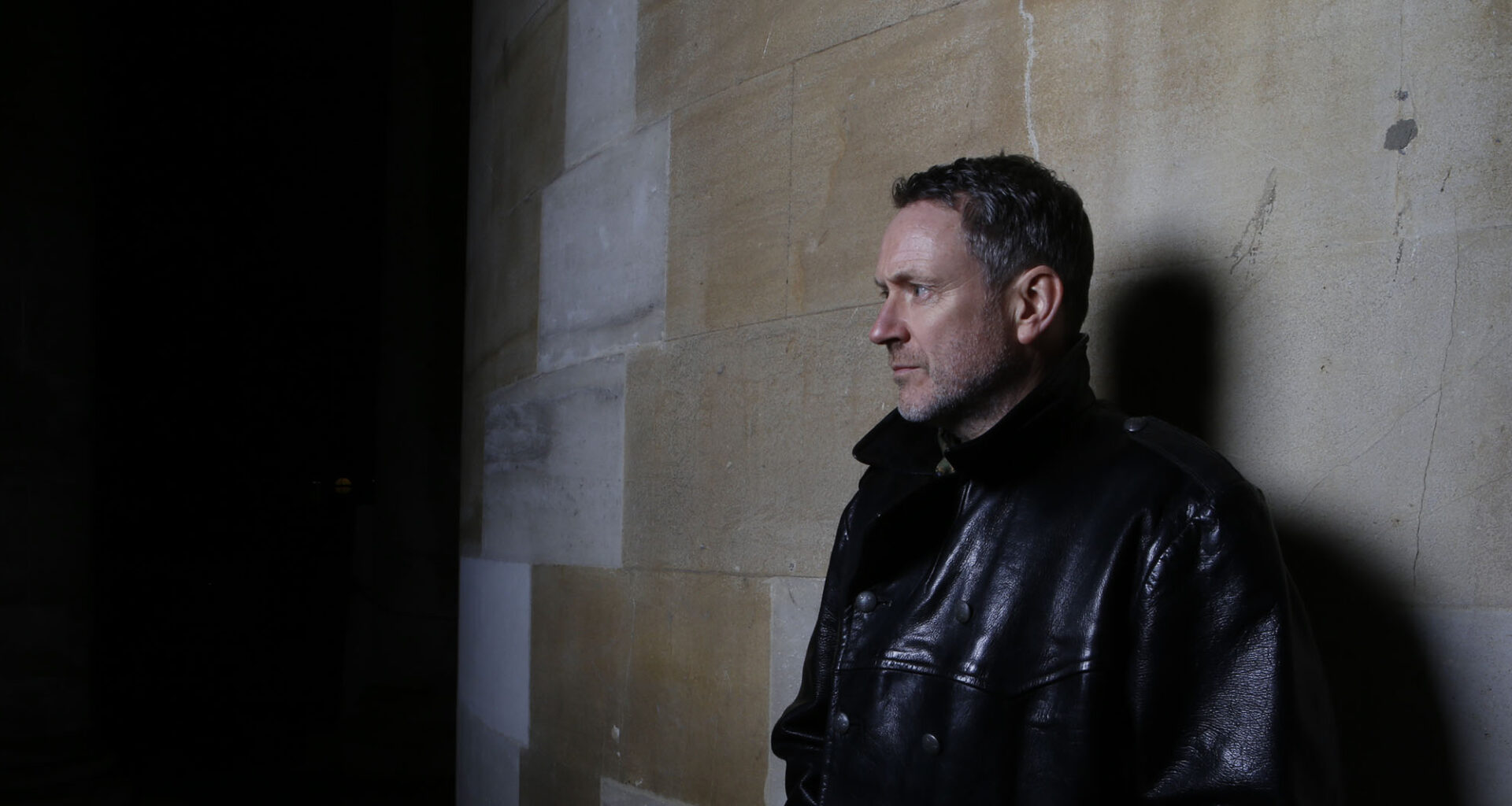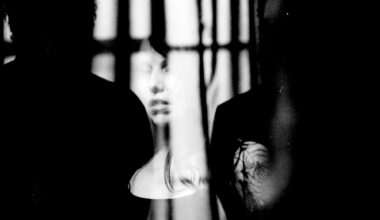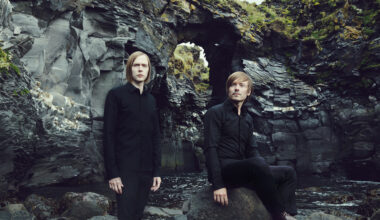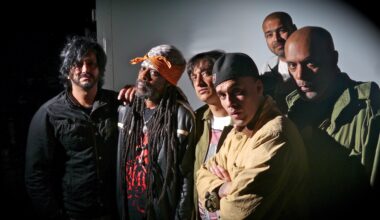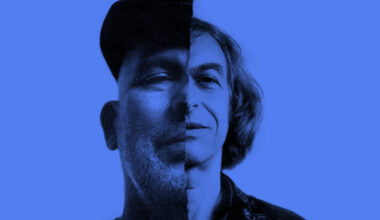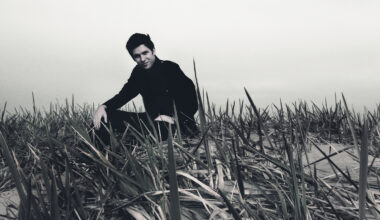Everyone likes Blancmange and their no-nonsense synthpop shizz, right? But forget what you think you know. With the release of an excellent new album, ‘Semi Detached’, Neil Arthur reveals why it really is time for a rethink
“This is lovely,” says Blancmange’s Neil Arthur, taking in the hubble and bubble and hustle and bustle around us in a central London bar. “I don’t get recognised anymore. Nobody’s spotted me.”
Pop stars come in all shapes and sizes. Back in the 1980s, Blancmange would have been a size large. The duo of Neil Arthur and Stephen Luscombe were ‘Top Of The Pops’ mainstays, clocking up a string of hits and a couple of gold albums between 1982 and 1984. The equivalent of a music industry hot wash saw their third long-player, 1985’s ‘Believe You Me’, emerge size medium. Not a bad album by any stretch, but it barely grazed the charts.
“I’m not deluded,” says Neil in his warm Lancashire burr. “I know the level we were at. We weren’t huge, but it was enough. If I went to a pub, if I went round a supermarket, there’d always be somebody. Most people were nice, but it didn’t sit comfortably with me. I just wanted to get away sometimes.”
We’re here to talk ‘Semi Detached’, Blancmange’s follow-up proper to 2011’s ‘Blanc Burn’. But first a bit of housekeeping.
“When you’re not having the hits, there’s no help from anybody,” he continues. “It’s a really weird thing, that. You’re only as good as your last hit and the next one has to be better. And then, when it doesn’t quite work out and the pressure starts, you go, ‘Hm, this isn’t much fun’. Me and Stephen got bored of working with each other in the studio, the machine had started to eat us, the monster, and we just wanted to preserve our friendship.”
But you know this, right? Split in 1987, made their return 24 years later with ‘Blanc Burn’. So why the re-tread? When you hear ‘Semi Detached’, it makes sense. It makes ‘Blanc Burn’ sound not so much the beginning of something, but the end, a kind of drawing of a line under Blancmange v1.0. We all need to do a little looking back before we can look forwards.
And ‘Semi Detached’ is very much the sound of moving forwards. For this record, Blancmange are a newly minted one-piece, with Stephen Luscombe handing over the reins to Neil full-time following his lengthy illness.
“He’s not well at all,” says Neil of Stephen, friendship fully preserved. “He won’t tour again, I’d love it, but I don’t think it’s going to happen. We’ve known each other a long time, so we had a chat and I’m doing this with his blessing. We did laugh about the fact that Blancmange has been going longer this time than it did first time round.”
Which begs the question, what makes this a Blancmange album and not a Neil Arthur solo outing?
“When I set out writing material, it was always with the view of it being a Blancmange album,” he explains. “There may have been a point where Stephen came in to do some production, but as it turned out he wasn’t well enough. I think it needs a name to belong to and the songs kind of belong to Blancmange.”
‘Blanc Burn’ was a punt into the unknown. Was anyone still interested in a band who last saw acclaim disappearing up the back-end of 1984? Was it some sort of catharsis?
“In terms of artistic fulfilment, and getting something out of your system, this is the way to go,” says Neil. “‘Blanc Burn’ was then and ‘Semi Detached’ is now. I’d rather do this than repeat perfectly what we did before. There’s no comparison for me. As David Thomas of Pere Ubu said, ‘Get to our age and now’s the time to rebel’. The one thing I’m certain of is I’m not certain.”
Turns out folk were still interested, with Blancmange’s return warmly received both on record and on stage. Knowing there’s an appetite for his music has clearly helped Neil because ‘Semi Detached’ is right up there with both ‘Happy Families’ and ‘Mange Tout’. It’s that good. It’s also Neil’s most revealing record. Scratch the surface of a career that’s spanned four decades and there’s surprisingly little known about Blancmange, even less about Neil Arthur himself.
“You can go so far, can’t you?” he says. “You might think you’re opening up, I think I’m very open in my songs, but I disguise the emotion.”
As a case in point, ‘Sad Day’ from ‘Happy Families’ is about his long-term partner Helen – and it’s an instrumental. In these days of every last thought being so publicly aired online, gentle souls like Neil Arthur, who express themselves beautifully without anyone going ‘Ouch’, are rare. What does he think that’s down to? Nurture rather nature?
“Mum and dad didn’t want me and my sister to endure what they’d had to,” he says. “They both worked in factories, nothing wrong with that, but they wanted us to have the opportunity to do something else. As I grew up, the thing I did all the time was draw.”
He wasn’t so good at spelling and maths. These days, they’d call it dyslexic. Back then, it didn’t have a name. Did he suffer at school because of it?
“I suppose looking back… possibly,” he admits. “But it didn’t feel like I did because I’d over-compensate by being a bit of a joker.”
A familiar tale, but to Neil’s parents’ credit they recognised his artistic talents. His dad, a foreman in a carpet factory, arranged a visit to see how carpets were designed.
“So I could’ve ended up designing carpets,” he says, “I thought, ‘That’s alright, they’ll pay me’, and then this opportunity came up to do an art foundation course at Preston.”
It was there that the tutors pointed him in the direction of a few well respected illustration courses, including one in Brighton and one in Harrow.
“I really wanted to be in London,” he says. “So I went for an interview at Harrow and they accepted me. We had a friend of the family we used to go to see in London, she was evacuated during the war and my family took her in, way before I was born, so I knew the city a bit. I just wanted to be there. With the music scene and everything going on… can you imagine?”
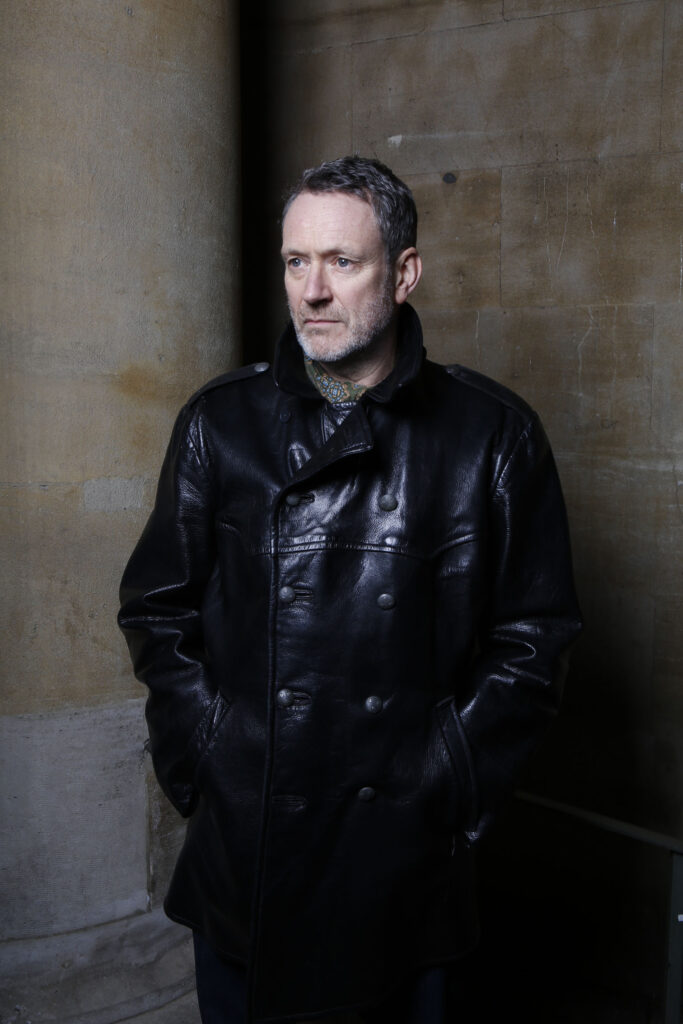
Neil was 18 when he arrived in London in 1977. Can you imagine? He was already well versed in what he was about to receive, musically speaking.
“My mate introduced me to Brian Eno’s ‘Here Come The Warm Jets’ album,” he says, “Eno really captured my imagination and I thought, ‘Well, I know where I’m going’, and that sent me on a journey. So you end up finding out about Cluster and then the Can connection and that takes you to Kraftwerk. When I met Stephen, he was of a similar vein. He really liked people like Beefheart. I was like, ‘Wow, this is fantastic’.”
Which explains the inclusion of what is only Blancmange’s second-ever cover version on ‘Semi Detached’. Two tracks into the album comes Can’s classic ‘I Want More’, which Neil and Stephen both loved the first time they heard it.
“Even then it was like, ‘This is a bit odd’,” he says. “So you have a listen to the album and it takes you on a journey again. It’s how I discovered Neu!, one of my all-time favourite bands. It was like, ‘Bloody hell!’.”
London has clearly had a big impact on Neil Arthur and it plays a leading role on ‘Semi Detached’. He met Helen in London, she was studying for her A-Levels at the higher education block that adjoined his art college, and they lived in the capital for three decades. They decamped to the Cotswolds with their two children eight years ago.
“We just wanted a change,” he offers. “A slightly slower pace. It seemed to make sense for the family.”
Chez Arthur is quite a musical hothouse. His son Joe is better known as house producer Applebottom. Has he had a word about the name?
“What can I say?” he smiles. “We called ourselves Blancmange.”
You were never keen on that, were you?
“Never was,” he admits. “We agreed on the name, but Stephen came up with it. We were called The Blancmange and then we changed it to Blancmange. At one point we were nearly called A Pint Of Curry, so it’s better than that.”
How’s it going for Joe?
“He’s had to leave college because he was that busy. I’m just proud of him doing what he does. You can get an education at any point. My daughter Eleanor sings and she’s on the album, on ‘Paddington’ and ‘I Want More’. She’s got a lovely singing voice… better than her dad’s.”
Families have a habit of keeping you busy, which goes some way to explaining why he stepped out of the public glare for 24 years. Above the parapet, there was a Neil Arthur solo album, 1995’s ‘Suitcase’, but further sightings were rare. Thing is, it was through choice rather than design.
“I didn’t want to do the same thing again after Stephen and I split in 1987,” he says. “Because what we did was really good and I didn’t want to fail to live up to that. So I thought, ‘I’m going to have a go at something else’. I had the opportunity to do some film music, which was ideal because I didn’t have to step into any limelight whatsoever. I didn’t have to be interviewed, I didn’t have to be onstage, which I didn’t want to be. I got completely fed up with it. I love it now, I really enjoy it, but no, I didn’t like it at that point.”
Working as a jobbing composer, he’s turned in a raft of soundtracks and theme tunes for BBC and Channel 4 documentaries, films and commercials, and has even held down a couple of side projects. In the late 80s, he worked with Malcolm Ross and David McClymont of Josef K and Orange Juice fame in Saturn 5. More recently there’s been AWP1 with Brian Warner, Pandit Dinesh and Dougie Neillands, which Neil delightfully describes as being “all acoustic with funny noises in the background”.
Back to the London love-in. There are two homages to the capital on the new album, ‘Paddington’ and the epic opener ‘The Fall’. Neil is clearly still very much in love with the place.
“I always have been,” he offers. “I absolutely adore this city. I used to go walking the streets at night. I love that time when the cars have gone and the people are in bed.”
So of all the places in London to write a song about, why Paddington?
“It’s not the prettiest,” he admits. “The station is noisy and bustling, but I get off the train and the first person who bangs into me I almost want to go, ‘Thank you’. I’m anonymous, I’ve just blended into the background.”
His writing is, always has been, a joy. It’s not just the warm, uplifting melodies that seem to pour out of Blancmange, it’s that each song is a mini drama, Neil the actor delivering it. It’s all down down down, over here, over there, I saw you, oh no, I miss you… So where does it come from, bearing in mind he likes his privacy? Is he a poet and doesn’t know it? Take the aforementioned ‘The Fall’.
“It’s not always me, but some of the songs are,” he offers. “The thing is, it’s not so much what they’re about… I’m trying to play with fragments of imagery and seeing where I can go with them. ‘The Fall’ started out as this story about an imagined situation where someone finds someone murdered on a beach. Initially the opening line was ‘When I saw you / By the moonlight / Walking in the flotsam / In the bay’. And then I thought about the Moonlight Club in West Hampstead, where I used to go and see bands… and then I thought, ‘Bloody hell’. I don’t know if I did see The Fall there, but I saw Joy Division there, so it’s about me observing my ex in that situation…”
A real ex?
“Well, no,” he sighs. “I’m in there, but I thought it would be good if the chorus reflected something of what those two people used to be about, what they would default to for comfort or to make the pain even more agonising.”
It’s The Fall! Mark E Smith!
“That’s why I like the idea,” beams Neil, watching our penny drop. “Or maybe it’s autumn or the book by Camus.”
So where is Smith in it?
“Ah,” he says, knowingly. “The other thing about it, if you wanted to analyse it, is I saw Mark E Smith at The Nashville in West London. I think it was a Human League gig, but Mark was in the audience. I had a few copies of ‘Irene & Mavis’ [Blancmange’s first EP] with me just in case, so it must have been 1980. So I gave one to Mark and he wrote back to me. He particularly liked ‘Concentration Baby’ and he really, really encouraged us. I love The Fall and I just thought, ‘Blimey’. With his written encouragement I was, ‘Right, I’m going to send a copy to John Peel’… and he bloody played it.”
You’re done, right there. Could’ve retired happy?
“We really could,” he laughs. “People say, ‘What was the most exciting time?’. It was when John Peel played your record.”
You just needed a ‘Top Of The Pops’ appearance and that would have been the full set.
“But we wanted to be alternative,” he protests. “Pere Ubu, Ludus, The Tiller Boys, Young Marble Giants, This Heat… that’s what I thought we were with our funny tape loops. To me, if I think Blancmange, I think of ‘Irene & Mavis’. ‘I’ve Seen The Word’, ‘I Can’t Explain’ and ‘Waves’ were all influenced by the way Young Marble Giants put their music together. We went off to see bands like that thinking we were going to do our version, whatever came out we wanted to try to structure our music like that. So how did we end up with songs like ‘Don’t Tell Me’ and ‘Living On The Ceiling’? I honestly don’t know.”
The other point to make about ‘The Fall’ is it’s a brazen way to start the record. A record, any record. It’s over eight minutes long, but it feels like three.
“It was that length right from the beginning,” says Neil. “It was always going to be that long, whether it was the first track or not. It just seemed to fit perfectly.”
And if that sounds good, and it is, wait until you hear the rest of ‘Semi Detached’. It’s a proper album that you listen to from start to finish, with peaks and troughs, joy and pain, a beginning, a middle and an end. There’s the instrumental ‘MKS Lover’, a tribute to the MKS-80 synth, and the bouncy pop vitriol of ‘Useless’. There’s the dark double whammy of ‘Like I Do’ and ‘Deep In The Mine’, the spiky fuck-you of ‘Acid’, and the bruising ‘Bloody Hell Fire’ finale, a song that leaves you sitting quietly, rocking gently, after it’s faded.
“After all these years, it’s incredible really,” Neil concludes. “Sometimes I feel like a bit of a fraud because I’m not a musician. I’ve been doing this so long that by default I can play, not very well, but I can play. I’ve got a bit of an ear for picking up a melody and some of my lyrics seem to string together and a number of people seem to like the idea of them. I’m quite lucky, really. You do your best, don’t you?”
